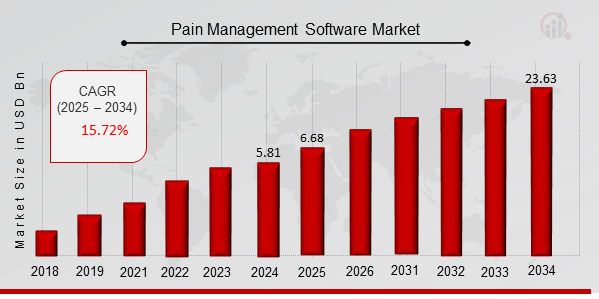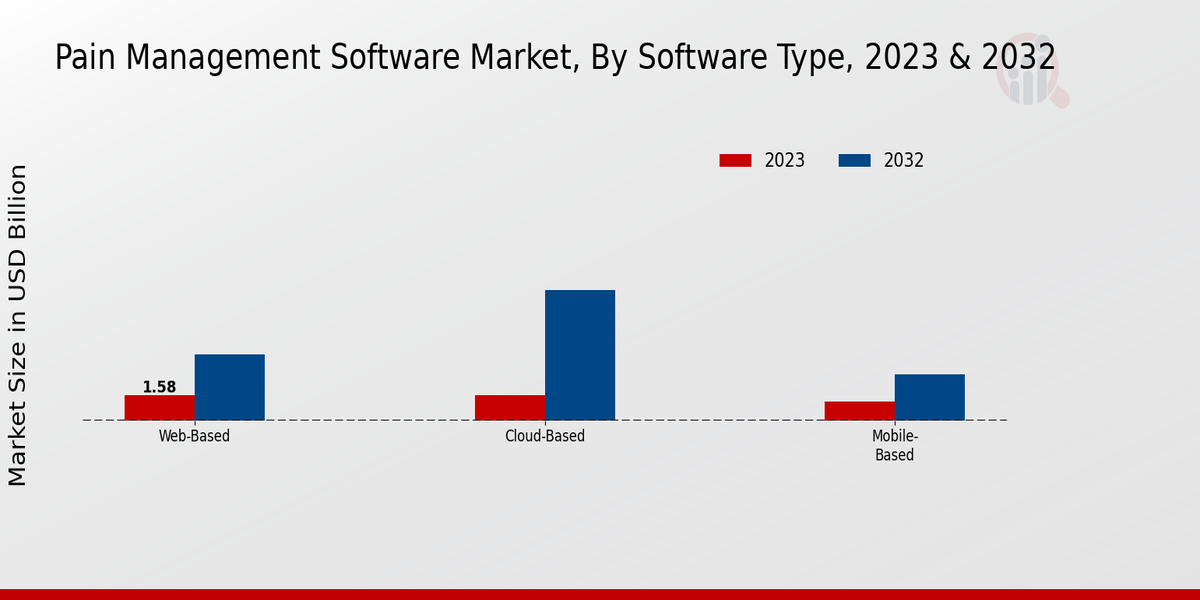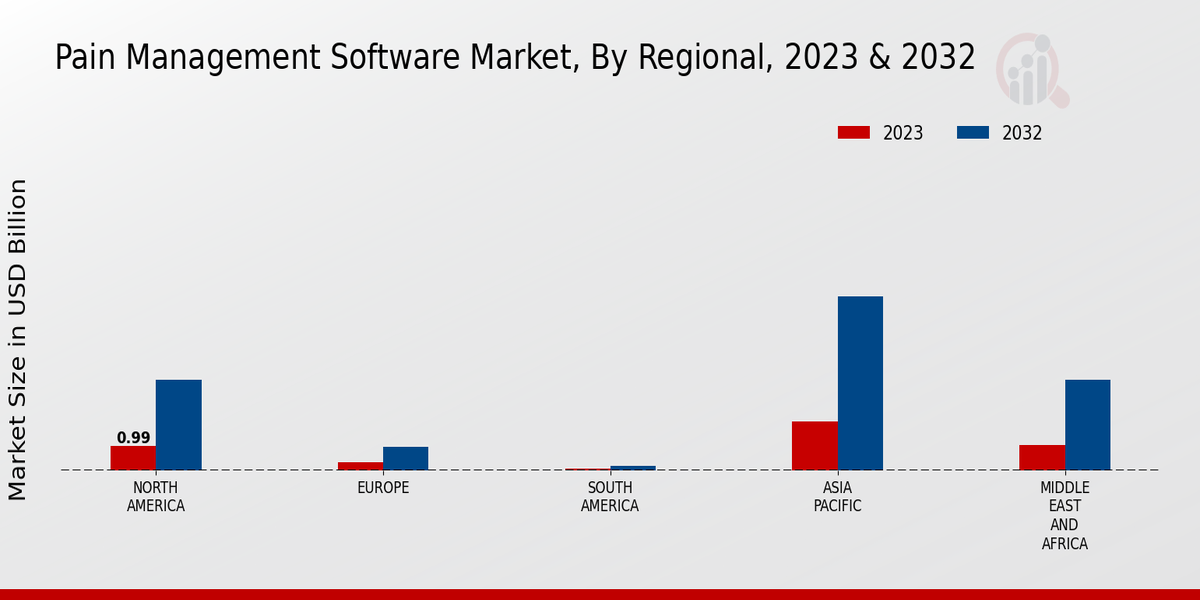Pain Management Software Market Overview
As per MRFR analysis, the Pain Management Software Market Size was estimated at 5.81 (USD Billion) in 2024. The Pain Management Software Market Industry is expected to grow from 6.68 (USD Billion) in 2025 to 23.63 (USD Billion) till 2034, at a CAGR (growth rate) is expected to be around 15.07% during the forecast period (2025 - 2034).
Key Pain Management Software Market Trends Highlighted
The Pain Management Software Market is projected to expand significantly over the coming years, driven by the rising prevalence of chronic pain conditions, increasing healthcare expenditure, and growing awareness of pain management technologies. The market is also benefiting from technological advancements, such as the integration of artificial intelligence (AI) and machine learning (ML), which enable personalized pain management plans and remote monitoring.Key market drivers include the growing demand for improved pain management techniques, the rising incidence of chronic pain conditions, and the increasing adoption of technology in healthcare.
Additionally, the emergence of value-based care models and the focus on patient satisfaction are also contributing to the market growth.Recent trends in the pain management software market include the increasing adoption of cloud-based solutions, the growing use of mobile applications for pain management, and the integration of wearable devices for pain assessment and monitoring. Furthermore, the market is witnessing a rise in partnerships between software vendors and healthcare providers to provide integrated pain management solutions.

Source Primary Research, Secondary Research, Market Research Future Database and Analyst Review
Pain Management Software Market Drivers
Advancements in Healthcare Infrastructure and Technology
The increasing adoption of electronic health records (EHRs), the proliferation of mobile devices, and the growing use of cloud-based services are driving the demand for pain management software. These technologies enable healthcare providers to access patient data more easily, communicate with patients more efficiently, and track patient outcomes more effectively. As a result, pain management software is becoming an essential tool for healthcare providers looking to improve the quality of care they provide to their patients.
Rising Prevalence of Chronic Pain
The growing prevalence of chronic pain is another major factor driving the demand for pain management software. Chronic pain is a complex condition that can have a significant impact on a person's quality of life. It can lead to difficulty sleeping, working, and participating in social activities. Pain management software can help people with chronic pain manage their symptoms and improve their quality of life.
Growing Demand for Personalized Pain Management
Personalized pain management application also drives the market growth of pain management software. Compared with traditional pain management, this new approach has more advantages. This is because traditional treatments tend to be one-size-fits-all, making them ineffective for many chronic pain patients. Pain management software can be customized to meet the specific needs of each patient. The user-friendliness of the software features facilitates patient-tailored applications since available patient symptoms, goals and preferences are recorded.
Pain Management Software Market Segment Insights
Pain Management Software Market Software Type Insights
The Pain Management Software Market is segmented by software type into web-based, cloud-based, and mobile-based. Among these, the cloud-based segment is expected to hold the largest market share in 2023, owing to its benefits, such as scalability, cost-effectiveness, and ease of access. The web-based segment is expected to witness significant growth during the forecast period due to its flexibility and compatibility with various devices.
The mobile-based segment is expected to gain traction, driven by the increasing adoption of smartphones and tablets in healthcare settings.In 2023, the Pain Management Software Market for cloud-based software is estimated to be valued at USD 1.54 billion and is projected to reach USD 5.28 billion by 2032, exhibiting a CAGR of 15.6% during the forecast period. The growth of this segment can be attributed to the increasing adoption of cloud-based solutions in healthcare organizations, which offer benefits such as centralized data storage, improved collaboration, and reduced IT infrastructure costs.
The web-based segment of the Pain Management Software Market is expected to reach USD 2.67 billion by 2032, growing at a CAGR of 14.8% from 2023 to 2032.Web-based pain management software offers advantages such as accessibility from any internet-connected device, ease of use, and cost-effectiveness, making it a popular choice among healthcare providers. The mobile-based segment of the Pain Management Software Market is anticipated to grow at a CAGR of 16.2% from 2023 to 2032, reaching a value of USD 1.85 billion by 2032.
The increasing use of smartphones and tablets in healthcare settings, coupled with the growing demand for remote patient monitoring and telehealth services, is driving the growth of this segment.

Source Primary Research, Secondary Research, Market Research Future Database and Analyst Review
Pain Management Software Market Pain Type Insights
The Pain Management Software Market is segmented into chronic pain, acute pain, and cancer pain. Chronic pain is the most common type of pain, affecting over 1.5 billion people worldwide. It is defined as pain that lasts for more than 12 weeks and can be caused by a variety of conditions, such as arthritis, back pain, and fibromyalgia. Acute pain is pain that lasts for less than 12 weeks and is typically caused by an injury or surgery. Cancer pain is pain that is caused by cancer and can be either acute or chronic.
The Pain Management Software Market for chronic pain is expected to reach USD 6.5 billion by 2024, growing at a CAGR of 12.5%.The market for acute pain is expected to reach USD 4.2 billion by 2024, growing at a CAGR of 11.8%. The market for cancer pain is expected to reach USD 2.8 billion by 2024, growing at a CAGR of 10.5%.
The growth of the Pain Management Software Market is being driven by a number of factors, including the rising prevalence of chronic pain, the increasing demand for pain management solutions, and the growing adoption of pain management software by healthcare providers.
Pain Management Software Market Application Insights
The Application segment of the Pain Management Software Market is expected to witness significant growth in the coming years. The increasing adoption of pain management software by healthcare providers is a major factor driving the growth of this segment. In 2023, the Diagnosis application segment held the largest market share, accounting for around 38.4% of the Pain Management Software Market revenue. This growth can be attributed to the rising demand for accurate and timely diagnosis of pain conditions.
The Treatment Planning application segment is also expected to grow at a rapid pace, owing to the increasing need for personalized and effective pain management plans.The Medication Management application segment is expected to grow at a steady pace, driven by the growing demand for efficient and safe medication management practices. The Patient Monitoring application segment is also expected to witness growth due to the increasing need for continuous monitoring of pain levels and patient outcomes.
Overall, the Application segment of the Pain Management Software Market is expected to grow at a CAGR of approximately 12.5% during the forecast period from 2023 to 2032.
Pain Management Software Market End User Insights
The Pain Management Software Market is segmented into various end users, including hospitals, clinics, home healthcare, and pharmaceutical companies. Among these segments, hospitals are projected to hold the largest market share in 2023, owing to the increasing number of surgeries, rising prevalence of chronic diseases, and growing demand for advanced pain management solutions. Clinics are another significant end user segment, as they offer a wide range of pain management services, including physical therapy, medication management, and counseling.Home healthcare is expected to witness substantial growth in the coming years, driven by the increasing adoption of remote patient monitoring and telemedicine services.
Pharmaceutical companies are also investing heavily in pain management software to improve the efficiency of drug development and clinical trials.
Pain Management Software Market Deployment Insights
The Pain Management Software Market is segmented based on deployment into on-premises and Software as a Service (SaaS). The SaaS segment is expected to hold a larger market share in the coming years due to its benefits, such as lower upfront costs, scalability, and accessibility. The on-premises segment, on the other hand, is expected to witness a steady growth rate due to the need for data security and control among healthcare organizations.
The Pain Management Software Market revenue for the SaaS segment is projected to reach $2.5 billion by 2024, growing at a CAGR of 16.5%.The on-premises segment is expected to generate $1.8 billion in revenue by 2024, growing at a CAGR of 14.2%. These insights are crucial for market participants to understand the competitive landscape and make informed decisions to gain a competitive advantage.
Pain Management Software Market Regional Insights
The Pain Management Software Market was valued at USD 4.38 billion in 2023 and is expected to reach USD 15.5 billion by 2032, exhibiting a CAGR of 15.07% during the forecast period. Regionally, North America held the largest market share in 2023 and is expected to continue its dominance throughout the forecast period. The region's well-established healthcare infrastructure, high adoption of advanced technologies, and increasing prevalence of chronic pain conditions contribute to its significant market share.
Europe is another prominent regional market, driven by factors such as government initiatives to improve healthcare outcomes, rising awareness about pain management, and a growing geriatric population.APAC is anticipated to witness the fastest growth rate during the forecast period due to increasing healthcare expenditure, rising disposable income, and growing awareness about pain management solutions. South America and MEA are expected to experience steady growth, supported by government initiatives to improve healthcare access and increasing demand for pain management software solutions.
 Source Primary Research, Secondary Research, MRFR Database and Analyst Review
Source Primary Research, Secondary Research, MRFR Database and Analyst Review
Pain Management Software Market Key Players And Competitive Insights
Major players in the Pain Management Software Market industry are consistently engaged in developing innovative solutions to cater to the evolving needs of healthcare providers and patients. Leading Pain Management Software Market players prioritize research and development to enhance the functionality and effectiveness of their software. This competitive landscape fosters continuous Pain Management Software Market development, driving the industry's growth and advancements. Key players engage in strategic partnerships, acquisitions, and collaborations to expand their market reach and strengthen their competitive position. They also focus on expanding their geographical presence to cater to the growing demand for pain management solutions globally.
Smaller companies and startups are emerging with niche offerings and specialized solutions, contributing to the diversification of the Pain Management Software Market Competitive Landscape.Epic Systems is a leading player in the Pain Management Software Market. The company's comprehensive electronic health record (EHR) system, EpicCare, incorporates pain management modules that enable clinicians to assess, diagnose, and treat pain effectively. EpicCare's pain management tools include pain assessment scales, pain medication management, and patient education resources. The software's interoperability with other systems allows for seamless data sharing and coordination of care.
Epic Systems' strong market position is attributed to its extensive customer base, established reputation for reliability, and continuous investment in research and development.Another prominent player in the Pain Management Software Market is Cerner Corporation. Cerner's Millennium EHR system offers integrated pain management solutions that support evidence-based practices.
The software features pain assessment tools, medication management, and clinical decision support capabilities. Cerner's focus on patient engagement and population health management aligns with the growing emphasis on patient-centered care in pain management. The company's strategic partnerships with healthcare organizations and its commitment to innovation have contributed to its strong market presence.
Key Companies in the Pain Management Software Market Include
- Allscripts Healthcare Solutions, Inc.
- Dragon Medical Practice Solutions, Inc.
- Quest Diagnostics Incorporated
- Netsmart Technologies, Inc.
- BioRad Laboratories, Inc.
Pain Management Software Market Industry Developments
The Pain Management Software Market is projected to reach USD 23.63 billion by 2034, exhibiting a CAGR of 15.07% during the forecast period (2025-2034). Key factors driving market growth include the rising prevalence of chronic pain conditions, increasing adoption of electronic health records (EHRs), and technological advancements in pain management software.Recent news developments in the market include In February 2023, Orion Health, a leading provider of healthcare IT solutions, acquired IMS Health's pain management software business.
This acquisition strengthens Orion Health's position in the pain management software market and expands its offerings to include a comprehensive suite of solutions for pain assessment, treatment planning, and monitoring. In March 2023, the American Academy of Pain Medicine (AAPM) released new guidelines for the use of opioids in chronic pain management. These guidelines emphasize the importance of using opioids judiciously and in combination with non-opioid therapies, such as pain management software, to achieve optimal pain relief while minimizing the risk of misuse and addiction.
In April 2023, the Centers for Medicare & Medicaid Services (CMS) announced new payment models for pain management services. These models aim to incentivize healthcare providers to use evidence-based pain management practices, including the use of pain management software, to improve patient outcomes and reduce healthcare costs.
Pain Management Software Market Segmentation Insights
Pain Management Software Market Software Type Outlook
Pain Management Software Market Pain Type Outlook
Pain Management Software Market Application Outlook
Pain Management Software Market End User Outlook
Pain Management Software Market Deployment Outlook
- Software as a Service (SaaS)
Pain Management Software Market Regional Outlook
| Report Attribute/Metric |
Details |
|
Market Size 2024
|
5.81 (USD Billion)
|
|
Market Size 2025
|
6.68 (USD Billion)
|
|
Market Size 2034
|
23.63 (USD Billion)
|
|
Compound Annual Growth Rate (CAGR)
|
15.07 % (2025 - 2034)
|
|
Report Coverage
|
Revenue Forecast, Competitive Landscape, Growth Factors, and Trends
|
|
Base Year
|
2024
|
|
Market Forecast Period
|
2025 - 2034
|
|
Historical Data
|
2020 - 2024
|
| Market Forecast Units |
USD Billion |
| Key Companies Profiled |
GE Healthcare, Allscripts Healthcare Solutions, Inc., Sonic Healthcare Limited, Cerner Corporation, Athenahealth, Inc., Dragon Medical Practice Solutions, Inc., Quest Diagnostics Incorporated, LabCorp, Netsmart Technologies, Inc., Epic Systems Corporation, McKesson Corporation, BioRad Laboratories, Inc., Siemens Healthineers, Carestream Health, eClinicalWorks |
| Segments Covered |
Software Type, Pain Type, Application, End User, Deployment, Regional |
| Key Market Opportunities |
AIempowered analytics Remote pain management Integration with EHRs Chronic pain management Patient engagement |
| Key Market Dynamics |
Increased prevalence of chronic pain technological advancements rising demand for personalized pain management government initiatives and integration with wearable devices |
| Countries Covered |
North America, Europe, APAC, South America, MEA |
Frequently Asked Questions (FAQ):
The Pain Management Software Market size was valued at USD 5.81 billion in 2024 and is expected to expand at a compound annual growth rate (CAGR) of 15.07% from 2025 to 2034, reaching a total market value of USD 23.63 billion by 2034.
The growth of the Pain Management Software Market is primarily driven by the increasing prevalence of chronic pain conditions, rising demand for personalized and efficient pain management solutions, technological advancements in pain management software, and government initiatives to improve healthcare infrastructure.
North America is expected to hold the largest market share in the Pain Management Software Market throughout the forecast period, owing to the high prevalence of chronic pain conditions, advanced healthcare infrastructure, and the presence of leading market players in the region.
Pain Management Software finds applications in various settings, including hospitals, clinics, rehabilitation centers, and home healthcare. It is used for pain assessment, treatment planning, medication management, patient monitoring, and patient education.
Major players operating in the Pain Management Software Market include Cerner Corporation, Epic Systems Corporation, Allscripts Healthcare, LLC, McKesson Corporation, and GE Healthcare.
The Pain Management Software Market faces challenges such as data privacy concerns, lack of interoperability between different software systems, and the need for continuous software updates to keep up with technological advancements.








 Source Primary Research, Secondary Research, MRFR Database and Analyst Review
Source Primary Research, Secondary Research, MRFR Database and Analyst Review







